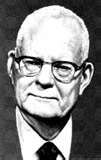About:
A former Wyomingite - W. Edwards Deming was an American statistician, educator, and consultant whose advocacy of quality-control methods in industrial production aided Japan’s economic recovery after World War II and spurred the subsequent global success of many Japanese firms in the late 20th century.
The son of a small-town lawyer, Deming attended the University of Wyoming (B.S., 1921), University of Colorado (M.S., 1924), and Yale University (Ph.D. in mathematical physics, 1928). He then taught physics at several universities, worked as a mathematical physicist at the United States Department of Agriculture (1927-39), and was a statistical adviser for the U.S. Census Bureau (1939-45). From 1946 to 1993 he was a business consultant and a professor of statistics at New York University’s graduate school of business administration. He was also appointed a distinguished professor in management at Columbia University in 1986.
In the 1930s Deming became interested in ways that statistical analysis could achieve better quality control in industry. Deming’s quality-control methods were based on a systematic tallying of product defects that included the identification and analysis of their causes. Once the causes of defects were corrected, the outcomes were tracked to measure the effects of those corrections on subsequent product quality.
In 1950 Japanese business leaders invited Deming to Japan to teach executives and engineers about the new methods. Japanese companies quickly adopted his methods, with the result being a commitment to quality control that helped Japanese firms dominate some product markets in many parts of the world. The Deming Prize (established 1951), awarded annually to Japanese corporations that win a rigorous quality-control competition, is named in Deming’s honour. It was not until the 1980s that Deming’s ideas were adopted by American corporations seeking to compete more effectively in the world market.
W. Edwards Deming
Here, Wyoming oral historian interviews Deming in 1991 for the Wyoming State Archive, the Department of State Parks and Cultural Resources.

